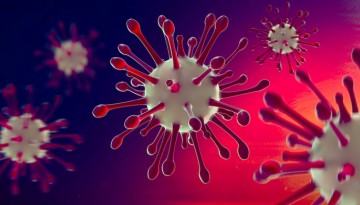 A newly discovered small molecule could be sprayed into people’s noses to prevent COVID-19 illness prior to exposure and provide early treatment if administered soon after infection, according to a study in mice led by Cornell researchers.
A newly discovered small molecule could be sprayed into people’s noses to prevent COVID-19 illness prior to exposure and provide early treatment if administered soon after infection, according to a study in mice led by Cornell researchers.
News
New study defines spread of SARS-CoV-2 in white-tailed deer
 North American white-tailed deer – shown in 2021 surveys of five states to have SARS-CoV-2 infection rates of up to 40% – shed and transmit the virus for up to five days once infected, according to a new study.
North American white-tailed deer – shown in 2021 surveys of five states to have SARS-CoV-2 infection rates of up to 40% – shed and transmit the virus for up to five days once infected, according to a new study.
Patient possibly cured of HIV infection by special stem-cell transplant
 A patient living with HIV who received a blood stem cell transplant for high-risk acute myeloid leukemia has been free of the virus for 14 months after stopping HIV antiretroviral drug treatment, suggesting a cure, according to the Weill Cornell Medicine and New York-Presbyterian physician-scientists who performed the transplant and managed her care.
A patient living with HIV who received a blood stem cell transplant for high-risk acute myeloid leukemia has been free of the virus for 14 months after stopping HIV antiretroviral drug treatment, suggesting a cure, according to the Weill Cornell Medicine and New York-Presbyterian physician-scientists who performed the transplant and managed her care.
Four assistant professors win 2022 Sloan fellowships
 Assistant professors Pamela Chang, Antonio Fernandez-Ruiz, Daniel Halpern-Leistner and Peter McMahon have won 2022 Sloan Research Fellowships from the Alfred P. Sloan Foundation.
Assistant professors Pamela Chang, Antonio Fernandez-Ruiz, Daniel Halpern-Leistner and Peter McMahon have won 2022 Sloan Research Fellowships from the Alfred P. Sloan Foundation.
Existing drug may protect against COVID lung injury
 An FDA-approved drug that has been in clinical use for more than 70 years may protect against lung injury in severe COVID-19 cases, according to a preclinical study from researchers at Weill Cornell Medicine and Cold Spring Harbor Laboratory.
An FDA-approved drug that has been in clinical use for more than 70 years may protect against lung injury in severe COVID-19 cases, according to a preclinical study from researchers at Weill Cornell Medicine and Cold Spring Harbor Laboratory.
Study finds gut fungi influence neuroimmunity, behavior
 A specific group of fungi residing in the intestines can protect against intestinal injury and influence social behavior, according to new preclinical research by scientists at Weill Cornell Medicine.
A specific group of fungi residing in the intestines can protect against intestinal injury and influence social behavior, according to new preclinical research by scientists at Weill Cornell Medicine.
Eight center members to receive Academic Integration seed funding
 Eight Center for Immunology members has been awarded Seed Funds from Cornell University’s Office of Academic Integration. The grants will support a wide array of work from research on a Pan-Coronavirus vaccine to a project to develop a microbial delivery system for a unique treatment of colorectal cancer.
Eight Center for Immunology members has been awarded Seed Funds from Cornell University’s Office of Academic Integration. The grants will support a wide array of work from research on a Pan-Coronavirus vaccine to a project to develop a microbial delivery system for a unique treatment of colorectal cancer.
New view of lymph nodes shows immune cells in real time
 Cornell researchers have for the first time imaged the entire depth of the lymph nodes in a living mouse using three-photon microscopy, which enabled them to observe the dynamic interactions of immune cells.
Cornell researchers have for the first time imaged the entire depth of the lymph nodes in a living mouse using three-photon microscopy, which enabled them to observe the dynamic interactions of immune cells.
Targeting brain’s immune cells may block Alzheimer’s
 A gene mutation linked to Alzheimer’s disease alters a signaling pathway in certain immune cells of individuals with the disease, according to a new study by scientists at Weill Cornell Medicine.
A gene mutation linked to Alzheimer’s disease alters a signaling pathway in certain immune cells of individuals with the disease, according to a new study by scientists at Weill Cornell Medicine.
New RFA announced: Immunogenomic Collaborative Seed Grants
 The Center for Immunology and the Genome Biology Task Force are excited to call for multi-investigator seed grant applications for innovative projects that will bring together researchers in genomics and immunology to tackle important questions and develop novel technologies to fuel discovery.
The Center for Immunology and the Genome Biology Task Force are excited to call for multi-investigator seed grant applications for innovative projects that will bring together researchers in genomics and immunology to tackle important questions and develop novel technologies to fuel discovery.



